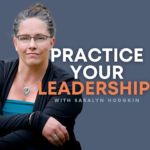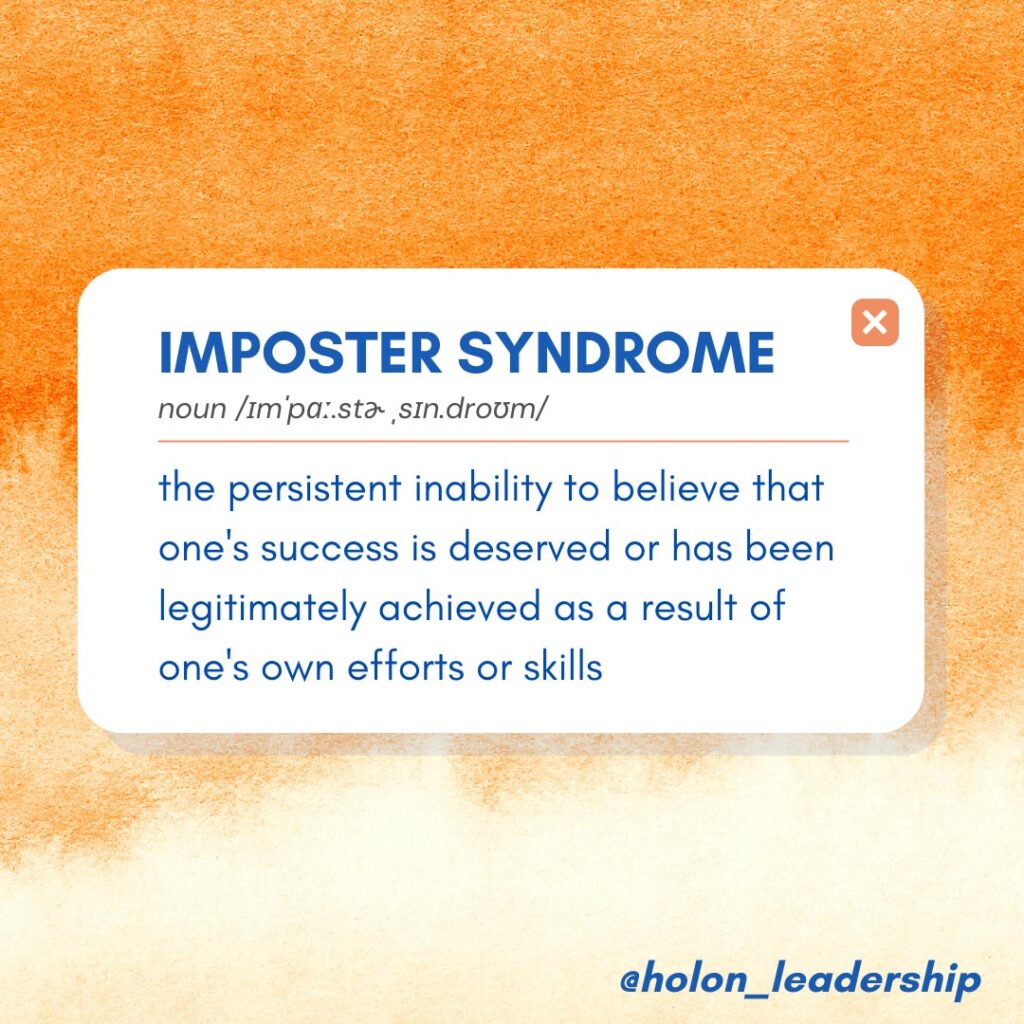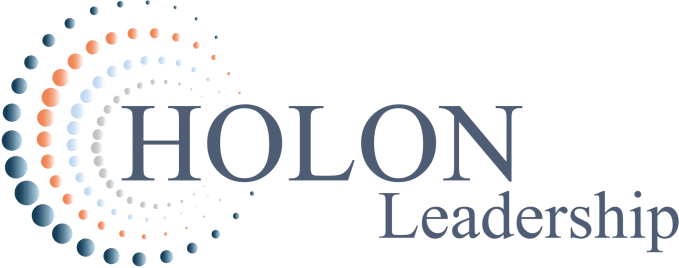57. Overcoming Imposter Syndrome
Is there a voice in the back of your mind that tells you you aren’t good enough? Does self-doubt get in the way of you and your brilliance?
You’re not alone. Imposter Syndrome affects us all.
It impairs our relationships, job performance, and overall fulfillment, and keeps a gap between who we are now and who we want to be. But it doesn’t have to.

Listen on
Resources
- Read the Indepedent’s article ‘A third of millennials suffering from ‘imposter syndrome’ in the workplace’
- Read the KPMG study that found around 75% of female executives experience imposter syndrome
- Read ‘Stop Telling Women They Have Imposter Syndrome’ by Ruchika Tulshyan and Jodi-Ann Burey
- Listen to our power conversation with Kirstin Battista on confidence
- To receive free worksheets with practices related to our podcasts, subscribe to the newsletter.

Transcript
Transcript is AI auto generated. Please excuse any typos.
Hi everyone. I’m Saralyn Hodgkin, and this is the podcast to practice your leadership.
Working on imposter syndrome, man, has this ever come up for so many people I’m talking with lately? It just, I, I don’t know what it is right now, but it just seems to be, uh, topic of the hour. And so, I know for me, imposter syndrome has been with me a long time. It is one of the members of my inner team, uh, that keeps me connected to my self-doubt and it has shown up in so many places and relationships and work in parenting in so many spaces.
And the active work I need to do to stay in my brilliance, to enable my own resiliency, to notice imposter syndrome, to tap into my strengths, my creativity, and into my career path, and self-author that career path and not be pulled into comparative analysis, self-doubt, fomo, uh, fear of missing out, like, Ooh. It’s a lot of work. It is a lot, a lot of work.
And I, I know I’m not alone. I think it was, um, think it was kpmg, uh, back in 2020, did a study focused on imposter syndrome, if I’m not mistaken. And there’s a stat in there where it said 75% of executive women report personally ex having experienced imposter syndrome.
And that stat has just stuck with me. And there was another one around millennials the finding stuck with me, which was one third of millennials suffer from imposter syndrome specifically in the workplace. And this isn’t just a woman thing, right?
Men, women, non-binary folk. However, people identify, uh, cross ages race, like this is showing up in humans. And, uh, we all know the effects or the presentation, right? It can be not speaking up. Um, it can be having such negative self-talk. It can create depression, anxiety, it contributes definitely to burnout.
It of course impairs relationships, job performance and fulfillment. It keeps a gap existing in our own, from our own special talents, higher callings, abilities, strength-based lenses. There’s, there’s a lot to it and it shows up for different people in different places. And I know for some the presentation of it can be like just putting confidence on as a mask, but all the stuff that’s actually going on in their head, like you have someone who was it I saw recently?
I think it was the actor, Kate Winslet. You know, she’s had a phenomenal career and she’s talking about imposter syndrome. And I can just imagine the confidence mask that is put on as people hustle for their worthiness, they’re feeling like a fraud and, um, all on the inside and the energy that that takes to manage all of that, uh, to keep that mask on.
I find it exhausting when, when I find myself trying to do it and. It can get to a place of not just being a mask, but being consumed by self-doubt, consumed by the idea that I can’t show myself. And so I, I hide myself, um, being consumed so much by self-doubt that the power of others’ words dictate who I am to me, oof. That’s happened to me.
Not being able to live up to who I wanna be. I’ve seen it in others. And the fears that it causes, the limiting beliefs, the comparisons, right? And there are places in the world where we show up that starts to confirm these things, right? Yes. Doubt your ability. Feel like a fraud.
Stay small. Don’t speak up so loud. Right? And then that comparative analysis just starts running rampant. And you know, when we connect this to inclusion, for example, and trying, creating inclusive spaces. It’s like, okay, great. Are you inclusive with yourself? Right? Um, are you creating belonging, acceptance, self-compassion, compassion for others?
Starts with self-compassion, are you cultivating some of the conditions within yourself? Cuz if you’re not, it sure is hard to then go out in the world and try to create inclusive belonging spaces for others. Um, yeah, so just tying some of this work together and context together. I feel like it’s important to take time to understand your own self-doubt, especially as it impedes bringing your full talent out into the world, your fullness. I think that the practice to noticing it, understanding it, hearing the words of it means of course as usual, stopping, noticing, taking a moment without judgment. My gosh, how hard is that?
But also to build your stories of confidence. To notice the way you’re talking to yourself and say, Ooh, hold on. Is that how I wanna talk to my best friend? Is that how I want my kids to talk to each other? Is that how I want to talk to my kids? Well, if not, there’s my gut check, Hmm, maybe I’m not speaking to myself in a way that is kind or powerful.
Do I notice myself comparing with others in a way where it’s just not serving me? Can I recognize that some of this is my work to do, but then also recognize when it’s not my work. When I recognize the systems that are around me that are built to keep me small. Systems of, in my world anyways, uh, systems of patriarchy, systems of white supremacy, colonization, these different systems that are in my cultural context where I am, and can I recognize when those systems are at play And it’s like, oh, yeah, that’s, that’s showing up in this team, that’s showing up in what this person is saying, that’s showing up in this, uh, lack of opportunity that I didn’t get.
Yeah. Okay. There are systems out there that are designed for me to stay in my self-doubt, stay low in my confidence to, uh, stay in my smallness. Okay. Yeah. Hold on, let’s just check that and then not, um, walk away from a conversation from lack of getting an opportunity or whatever it is and saying, oh gosh, I just, I guess I’m not good enough.
Oh, no, no, no, no. There’s a system at play that is not accepting my powerfulness in this moment, or whatever it might be, right? So there’s like two entities of work. There’s the work I need to do in myself, and there’s the work I need to do to see the, the places I show up that, oh, that, that’s on them.
That’s not mine, right? Because I need to stay in a place that values my contribution, my worth, my experiences, my voice. Whew. That’s hard, right? It’s a lot of work and part of it is also noticing and practicing. That’s what makes the work, the work. And so part of it is like this accountability. I was talking to somebody the other day about an accountability list, and it’s like, okay, what’s the accountability that I have to myself to stay in my confidence?
Right? If I had an accountability checklist, it would be like, okay, my checklist is, um, Am I staying in places and levels of joy? Like where’s my level of joy right now in, in this moment? Where is my self-doubt in this moment, right? Like, if I have an accountability list to be able to live in my path, then where am I noticing and just doing a double check on the self-doubt, on the imposter syndrome, right?
Along with my boundary checks and my confidence checks and my higher purpose calling checks. Bringing this into my accountability list to then be able to choose that confidence. Especially if what I wanna be able to do is my own work on imposter syndrome, but also see when it comes up in others and become um, or, or enable behaviors of mine to become a good ally to others to say, Hey, whoa, hold on.
I see you doubting yourself in this moment. Can we just pause for a moment? Cuz that’s not what I see. Right? How do we need to be? What do we need to learn to see in others? Support them in a strength-based approach with practical tools that that helps others also find their confidence, their talent, their contribution.
So how do we go about standing in our brilliance for ourselves so we can lift each other up? So we can stand in our purpose and our calling? So we can be there for our families, our, our whoever’s, right? Um, standing in your brilliance takes choice and it takes practice. So what can I offer here as prompts?
Here’s some prompts. First, getting curious with imposter syndrome, like what’s your experience with it? Like go all the way back to when you were a kid. What are some examples of it? And just notice it. Notice how it’s morphed in your life. What does it look like? And almost come to a place of befriending imposter syndrome and befriending self-doubt and being curious with it all.
And just saying, where have you shown up? Why have you shown up? When did you show up? And do I wanna have you continue doing that? Okay, not judgy, not angry. Just like what is my experience with imposter syndrome, with self-doubt, or maybe you call it a different name. What has been and is my experience and just like the who, what, when, why, uh, what’s the five W’s again, whatever.
It’s like what’s been, what has been and what continues to be your experience. Just to get curious and then simply ask yourself, okay, what am I learning? What do I want now? Great. And, uh, second to that is to explore confidence. Just a, it’s a different angle in, right? What does confidence mean to me? Right?
When I’m thriving and delighted and at ease, or however you start curling that, what does confidence mean to me? When do I see it? How do I see it? When have I seen it in my life and why? And playing with the conditions, right? The who, what, where, when, why, the conditions of confidence.
Um, and then also playing with the emotions of how I feel when I’m confident and thriving, right? Just again, not judging, curious. And then the third part of this is to seeing imposter syndrome or self-doubt, you know, mashed together with confidence and thrivability.
How does imposter syndrome affect my confidence? And inverse the question, how does my confidence, when I stand in my brilliance for that moment, how does it affect my self-doubt, my imposter syndrome? What are the stories I tell myself from that place? How do I feel from that place?
And then lastly, it’s the noticing practice, right? What are some of the ways that I can recognize, notice, flip into what serves me? So how do I recognize and notice when the imposter syndrome and the self-doubt is coming without judgment, right? Just take a breath, notice it, and maybe in the moment, or maybe it’s hours later or days later, right?
When you feel in a place that you can, you can handle the process. It’s like, okay, what did I notice? What do I wanna do now with it? How did it, how did it affect things? And how do I wanna flip it from a place of learning and growth mindset folks, not from a place of, well, I should have and bba, but no.
Thanks shame for showing up and trying to protect me. How about you take a backseat and now let’s, I just want to come into a place of learning. Now, some people come and ask me, they’re like, but how do I do it in the moment? So here are a couple of tricks. Breathing. Keeping for me personally, like keeping my mouth shut and breathing because sometimes silence is your best friend for me anyways, other times is for those of you who have seen this, um, using your thumb, and pushing it in to each one of your fingers, nice and slow.
You can do that under a table. You can not show that on camera. Um, you can do that behind your back. Um, and it’s just like, okay, if I get into this moment of, of pausing, taking a breath, and then just slowly but surely having this physical act of pushing my thumb into my first finger. My second finger.
My third finger, my pinky. Right. Okay. That reminds me, and it starts be to become a physical cue to say, and then maybe have a mantra right to say I’m the shit. To say I love who I am to say I’ve got this to say whatever it is that your confident self says. Right? Even if it’s a word, right? You know, we can’t just tie a string around our finger.
Sometimes that physical act really helps. So notice, take a breath and then thumb into each finger. When, when you’re in the moment, um, allows you to collect yourself. And then it also allows your, your lizard brain to say, okay, maybe I’m not being hijacked right now from a threatening something, I can stay calm because the calmer, of course, you can stay in that brain.
Then the higher executive functioning order brainy thingy can come into full effect to be able to problem solve, you know, make choices of resiliency, make responsive behavior choices, can come into creativity and then maybe in time be able to think of how do I wanna respond in this moment when I’m feeling self-doubt, I’m nervous to say whatever I’m about to say, but I wanna say it.
Or however that plays out for you, right? Coming into that place of I call it resilience and responsiveness, right? It means that I need to do something in the moment to notice, breathe, tap into my fingers and just be like, okay, but it means you have to do the work, I just suggested, you gotta do that work first, right?
Not just first, but you gotta do that work, right? Getting curious about imposter syndrome, getting curious about confidence, being able to see how the two mash together, what it means to come into that confidence state, and then all, you know, the, the question here is what do you need to be at your best at any given time, and where are you not getting that right?
Because some of this work is for us to do and to be, but sometimes we’re showing up in systems where it’s like, this system does not, or this context, or this team, or these conditions do not enable me to be at my best. And then there’s a whole different conversation going on, but to be able to add to this list of what do you need to be at your best in understanding that, and when you are present in a situation where these are not the conditions for me to be at my best, acknowledge that.
Maybe not out loud, maybe it’s just inside, but just be like, okay, yeah. This is not a place where I’m gonna be at my best. This is a place that’s gonna bring my self doubt out. Okay. How am I gonna manage that right now? Breathe right. Okay. Confidence. Defining it, being curious of yourself, befriending doubt and imposter stuff.
Getting clear on your confidence in standing in your brilliance, folks. We need you to be doing it. We need you to be doing it right. Tell yourself stories that enables yourself and those around you to stand in your brilliance, please.
My ending question, of course, will be what will you focus your practice on when it comes to standing in your brilliance and putting imposter syndrome in its place?
Thanks all. I’m Saralyn. You can find me at holonleadership.org. I walk alongside you as you practice your leadership.
Join Our Newsletter
Subscribe to our newsletter today and receive a FREE reflective workbook to guide you through my Top 5 Leadership Practices.

 Apple Podcasts
Apple Podcasts Spotify
Spotify Google Podcasts
Google Podcasts